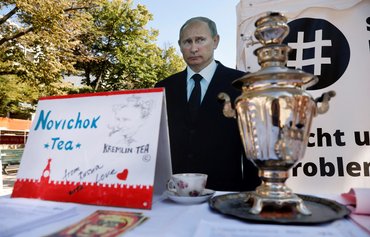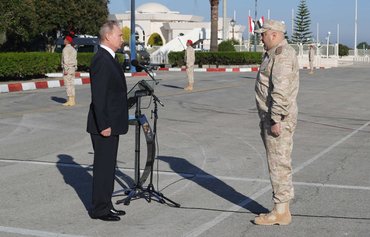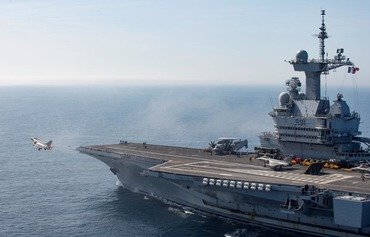Analysis of a video propagated widely on social media highlights the lengths the Kremlin is going to in trying to convince Arabic and Russian speakers that the US is supporting the "Islamic State of Iraq and Syria" (ISIS).
The Kremlin-controlled website Russkaya Vesna (Russian Spring) posted a video on YouTube on September 6th that claims to show an ISIS fighter in Syria admitting the US had been supporting his group.
But a host of details cast serious doubt on the authenticity of these confessions.
The eight-minute video shows a man tied up, blindfolded and kneeling before a group of individuals who do not appear on camera.
![A screenshot from a video propagated by a Kremlin-backed website shows the interrogation of an alleged ISIS fighter. The subtitle says, "The Americans provided food and weapons." The subtitles not only misconstrue the answers but also hide the obvious coaching. [File]](/cnmi_am/images/2018/09/19/14557-syria-isis-captive-600_384.jpg)
A screenshot from a video propagated by a Kremlin-backed website shows the interrogation of an alleged ISIS fighter. The subtitle says, "The Americans provided food and weapons." The subtitles not only misconstrue the answers but also hide the obvious coaching. [File]
![A handout photo released on the official Facebook page of the Syrian Presidency on December 11th shows Russian President Vladimir Putin and Syrian President Bashar al-Assad meeting with Russian military officers in the Russian air base in Hmeimim in Syria's Latakia province. [Syrian Presidency Facebook page/AFP]](/cnmi_am/images/2018/09/19/14558-syria-putin-assad-600_384.jpg)
A handout photo released on the official Facebook page of the Syrian Presidency on December 11th shows Russian President Vladimir Putin and Syrian President Bashar al-Assad meeting with Russian military officers in the Russian air base in Hmeimim in Syria's Latakia province. [Syrian Presidency Facebook page/AFP]
![A US Air Force B-1B Lancer aircraft is refueled by a KC-10 Extender over an undisclosed location April 14th, 2018. The aircraft were taking part in strikes against Syrian targets in response to the use of chemical weapons. [Staff Sgt. Erica Rodriguez/US Air Force Central Command]](/cnmi_am/images/2018/09/19/14585-us-b1-aircraft-600_384.jpg)
A US Air Force B-1B Lancer aircraft is refueled by a KC-10 Extender over an undisclosed location April 14th, 2018. The aircraft were taking part in strikes against Syrian targets in response to the use of chemical weapons. [Staff Sgt. Erica Rodriguez/US Air Force Central Command]
![A US Air Force F-22 Raptor from the 94th Expeditionary Fighter Squadron at al-Dhafra Air Base in the UAE, flies over southwest Asia, September 12th. The F-22 performs both air-to-air and air-to-ground missions in order to defeat threats to the US and their partners in the region. The US has threatened to respond if the Syrian regime uses chemical weapons in its offensive on Idlib. [Staff Sgt. Ross A. Whitley/US Air Forces Central Command]](/cnmi_am/images/2018/09/19/14583-us-f22-chemical-600_384.jpg)
A US Air Force F-22 Raptor from the 94th Expeditionary Fighter Squadron at al-Dhafra Air Base in the UAE, flies over southwest Asia, September 12th. The F-22 performs both air-to-air and air-to-ground missions in order to defeat threats to the US and their partners in the region. The US has threatened to respond if the Syrian regime uses chemical weapons in its offensive on Idlib. [Staff Sgt. Ross A. Whitley/US Air Forces Central Command]
![Children on September 12th try on improvised gas masks in Binnish in Syria's Idlib province. The Syrian regime and its Russian ally are threatening to retake Idlib. [Muhammad Haj Kadour/AFP]](/cnmi_am/images/2018/09/19/14559-syria-gas-mask-600_384.jpg)
Children on September 12th try on improvised gas masks in Binnish in Syria's Idlib province. The Syrian regime and its Russian ally are threatening to retake Idlib. [Muhammad Haj Kadour/AFP]
A man in military fatigues speaking Syrian-accented Arabic conducts the "interview" with the alleged ISIS element Suhaib Izzedin al-Zoabi (aka Abu Omar al-Horani) of Deir al-Bukht, who also speaks with a Syrian accent.
There is a striking difference between the spoken Arabic and the Russian subtitles provided by Russkaya Vesna. The subtitles not only misconstrue the answers but also hide the obvious coaching going on in the video.
The interviewer begins with a series of simple questions -- "What is your name?", "What is your nom de guerre?", "Where are you from?" -- to which the captive mumbles his responses that the interviewer repeats.
The interviewer repeats his fourth question -- "What detachment were you in?" -- several times and in different ways as the captive does not appear to understand how to answer it.
First al-Zoabi says, "I was in ISIS". The interviewer responds, "Yes, ISIS, but which group exactly? Who was the leader of your group? Who was the emir of your group?"
"We were in the al-Hajar al-Aswad [detachment]," the captive said, to which the interviewer repeats, "But who was your leader at al-Hajar al-Aswad?"
The captive remains silent, then the interviewer, losing patience, says, "What is wrong with you? Who is the leader of your current group, who is the emir?"
"The Iraqi [Abu] Bakr al-Baghdadi," al-Zoabi says, referring to the leader of ISIS.
"Who is the leader of your current group? The group you were in where we caught you?" the interviewer repeats once more.
Someone off camera feeds the answer to al-Zoabi, who appears to finally give the answer the interviewer wants.
"The field commander of the al-Hajar al-Aswad detachment is Abu Ayoub al-Iraqi" -- whose name was transliterated in the subtitles as Abu Bakr al-Iraqi.
"The size of the group in [al-Suwayda desert] is about 1,500 militants and the number of militants in my detachment is 250. The weapons were provided by the Americans."
The repeated questions and answers fed to the captive are missing from the Russian text.
Captive is being coached
In the second series of questions, the interviewer asks the captive about the recent ISIS attack on al-Suwayda.
"What task did you perform during the attack?", he asked.
"Our group consisted of suicide bombers," al-Zoabi says. "We were supposed to carry out attacks from within and outside al-Suwayda simultaneously. One group was sent toward Idlib to shoot a provocative video of chemical attacks so that the Syrian Arab Army [regime] would be blamed."
This answer presents a frequent narrative used by the Kremlin to obscure blame for the regime's chemical attacks on the Syrian population.
It is worth noting that al-Suwayda, in southeastern Syria near the Jordanian border, is more than 400 kilometres from Idlib, in northeastern Syria close to the border with Turkey.
Another instance where the Russian translation differs from the Arabic is the point when the interviewer asks al-Zoabi where his training was held.
In Arabic, he answers, "ISIS trained me in al-Rukban refugee camp".
The Russian subtitles, however, say, "The Americans trained me in ISIS's ranks in al-Rukban refugee camp".
In addition to these discrepancies and clear coaching from off camera, the captive, who admits to having joined ISIS for financial motivations, is visibly distressed, mumbling through most of the video.
Social media users mock video
Many Arabic and Russian speakers have questioned the video's authenticity, taking to various social media platforms to point out discrepancies.
On YouTube, many Russian speakers posted derogatory comments.
"What kind of staged production is this? At 1.11 the soldier asked a question and tells the prisoner what name to give," commented Abu Bublik.
"Another day of filming at Ostankino.... [Russian state TV's studio]," wrote Vova Kopeikin.
"This is only for the Russian [-speaking] audience, who does not understand what is behind the scene, how [someone] is suggesting in Arabic what [the prisoner] needs to say," added Ahmed Hasan.
"Half the translation is wrong. I would not be surprised if this [video] is staged," wrote Ramil Gaifullin.
"The video does not look real at all. How on earth does he know who supplied him food and weapons?" asked Pristsilla Tabaki. "Are they bringing food to the militant camp on US trucks? ... This is blatant propaganda."
Arabic-speaking viewers had a similar response.
"Bad acting, idiot Shabihas [derogatory term for pro-Syrian government personnel]. The pig Russians learned lying from the regime and have expounded its lies," Muhammad Su said on Facebook.
"The captive did not mention what they [the Russians] used to brainwash him. The detective forgot to ask him, was it Persil or Ariel?" said Khaled Alsa, referring to laundry detergents.
"A three-dimensional lie," Abu al-Waleed Albukamali said, commenting on the same Facebook post. "An ISIS element who was trained in al-Rukban camp and yet knows what the Free Syrian Army and Jabhat al-Nusra are planning in Idlib."
A history of propaganda
Russia's latest attempt at slandering the US can be seen as means to divert attention away from the Syrian regime's use of chemical weapons and other war crimes against civilians.
On September 11th, the Kremlin claimed that Syrian opposition fighters in besieged Idlib had begun working on a film that would be presented to the world as the aftermath of an alleged Syrian regime chemical attack, AFP reported.
Russia used a similar narrative in the aftermath of the Syrian regime's April chemical attack in Douma, which killed at least 40 civilians and hospitalised more than 500.
According to Russian Defence Ministry spokesman Igor Konashenkov, Britain pressured the White Helmets to fake the chemical attack.
British Ambassador to the UN Karen Pierce called Konashenkov's remarks "grotesque" and "a blatant lie", saying the allegations were a product of "the Russia propaganda machine".
The US, France and Britain on August 21st threatened to respond if Syrian President Bashar al-Assad uses chemical weapons in the regime's offensive to retake Idlib province.
"We underline our concern at the potential for further -- and illegal -- use of chemical weapons," they said.
"Just so there is no confusion here, if the Syrian regime uses chemical weapons we will respond very strongly and they really ought to think about this a long time before they come to any decision," US national security adviser John Bolton said.







